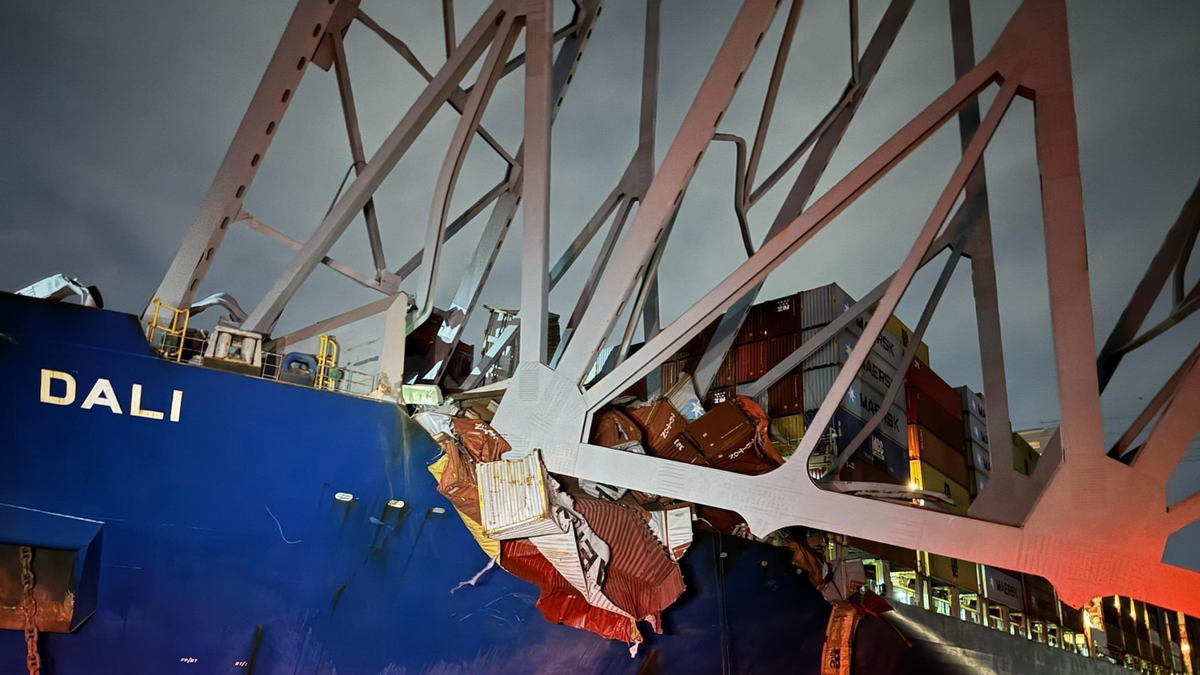While the investigations into the Francis Scott Key bridge collapse are just getting started, it seems the captain of the Dali cargo ship did everything he could to try and prevent a catastrophe, including dropping the port anchor to drag along the bottom of the bay in order to slow the ship’s momentum.
The captain also turned the ship rudder hard to the left as the Dali, which was traveling at eight knots (common for the bay) when it lost power, drifted hard to the right towards the bridge pylons. Clay Diamond, the executive director of the American Pilots’ Association, told the Washington Post it is not unusual for a ship of this size to lose engine power (which…yikes) but a total blackout is less common.
“It’s not unheard of for a pilot to experience an engine casualty, it’s not that common to have a full blackout like this,” he said. “This is a complicated piece of equipment so it could be any number of causes.”
Foreign-flagged ships are required to have pilots aboard to guide them in and out of U.S. ports. Pilots have detailed knowledge of local shipping channels and complete an apprenticeship before becoming fully qualified. Diamond said they don’t take direct command of the vessel, but work with its crew to get it safely out to sea.
However, given the ship’s size, speed and proximity to the bridge when it lost power, these actions did little to slow the ship, experts told NBC:
“An engine conking out 3 miles out in the ocean is an aggravation and an economic problem, because you lose time,” said Henry Lipian, a retired Coast Guard lieutenant and founder of the Introtech accident reconstruction firm. “In a narrow channel at night, with a bridge in front of you, I couldn’t think of a worse situation to deal with.”
A ship can drop anchor in an attempt to avert a collision, but given the Dali’s size, speed and distance from the bridge, such a move most likely wouldn’t have helped, said Morgan McManus, an instructor at SUNY Maritime College in New York who has worked on cargo ships and tankers.
“At 8 knots you need a couple thousand yards to do it,” McManus said.
Meanwhile, search and rescue efforts at the site of the collapsed Francis Scott Key bridge in Baltimore transitioned to recovery efforts Tuesday night as rescue workers lost hope in finding the six road workers still missing.
The Coast Guard announced at 7:30 p.m. Tuesday night that it was too dangerous for divers to continue to search for the missing members of the road work crew. Murky water conditions, changing tides and sharp objects in the water impeded efforts, which resumed at 6 a.m. Wednesday morning. The six still-missing individuals were part of a construction crew patching pot holes in the bridge. Here are the victims, according to CNN:
Father-of-three Miguel Luna, who is from El Salvador but has called Maryland home for 19 years, was among those missing, according to CASA, a nonprofit that provides services to working-class and immigrant families. A Honduran father of two, Maynor Yassir Suazo Sandoval, has also been missing since the bridge collapse, the man’s brother told CNN. He said his brother has lived in the US for 18 years and has an 18-year-old son and a 5-year-old daughter.Two Guatemalans are among those unaccounted for, the country’s foreign ministry said. Those missing include a 26-year-old from San Luis, Peten, and a 35-year-old from Camotan, Chiquimula. The ministry did not name the men.The victims also include Mexican nationals but it is unclear how many, a Mexican Embassy official told reporters near the scene of the bridge.
“Our hearts are with the families and loved ones of the victims,” Maryland Gov. Wes Moore said Tuesday evening after rescue efforts ended. “We will continue to work in partnership with leaders at the local, state, and federal levels to ensure that we can provide all those affected with the closure they deserve.”
The men were employed by local construction company Brawner Builders. Executive vice president of the company, Jeffrey Pritzker, told the Associated Press that the crew was patching pot holes in the middle of the bridge when the collision occurred:
“This was so completely unforeseen,” Pritzker said. “We don’t know what else to say.”
“We take such great pride in safety, and we have cones and signs and lights and barriers and flaggers,” he added. “But we never foresaw that the bridge would collapse.”
First responders rescued two members of the road crew shortly after the collapse, one of which sustained no injuries and the other was taken to University of Maryland Medical Center and later released, according to CBS.
The 985-foot cargo vessel the Dali crashed into the Francis Scott Key bridge in Baltimore just before 2 a.m. on Tuesday. The massive ship took out one of only two support pylons, sending the bridge into the cold Baltimore Bay below. Current reports say the ship completely lost power while navigating out of the bay. The crew were able to send a mayday that allowed officials to close the bridge to any through traffic, likely saving many lives. As of this writing, the collapse of the Francis Scott Key bridge is being treated as a freak accident. The National Transportation Safety Board is already on site, and both President Joesph Biden and Transportation Secretary Pete Buttigieg plan to visit the site in the coming days.

